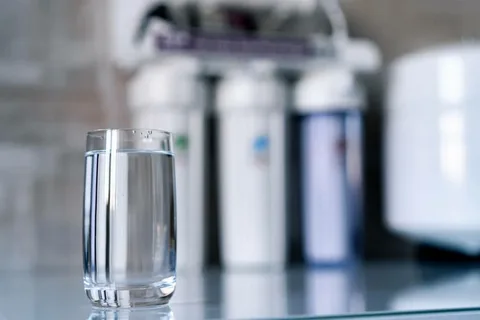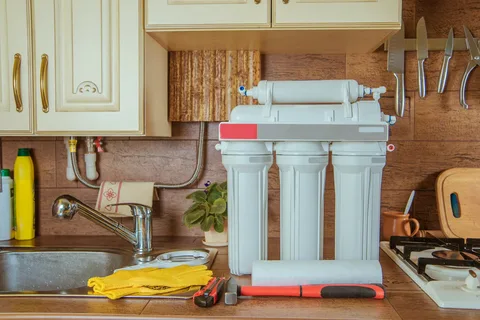When it comes to ensuring the health and safety of your family, one of the most important factors to consider is the quality of the drinking water in your home. With rising concerns about water contamination and impurities, investing in a home water filter is becoming increasingly popular. Home water filters are designed to remove harmful substances and improve the taste of your drinking water, providing you with clean and fresh water straight from your tap. In this blog post, we will explore the various types of home water filters available, how to choose the right one for your needs, and the impact a water filter for home can have on your health and lifestyle.
Understanding the Need for Home Water Filters
The necessity for home water filters is emphasised by the fact that tap water, despite its clear appearance, can harbour many contaminants detrimental to our health. These contaminants encompass a wide range, from heavy metals like lead, which pose significant health risks even in small quantities, to chlorine, which is used widely for water treatment but is problematic for taste and health.
Additionally, pesticides and bacteria present in water can lead to serious health issues. Utilizing a home water filter effectively removes these impurities, safeguarding your family’s health. Besides the health implications, there’s also the matter of taste and odour; water straight from the tap can often have an unpleasant taste or smell that discourages consumption. Ensuring the cleanliness and palatability of your drinking water through filtration protects health and enhances the enjoyment and consumption of water, promoting hydration and overall well-being.
Given the increasing concern about water pollution and the potential for existing infrastructure to falter, the role of home water filters in providing an additional layer of protection is more important than ever.
The Various Types of Home Water Filters Explained
Navigating the plethora of home water filtration options can be daunting. However, understanding the key distinctions amongst the various systems available is crucial for making an informed decision that aligns with your specific needs. Activated carbon filters stand out for their efficacy in removing organic compounds, chlorine, and odours, thus significantly enhancing the water’s taste. These filters operate by adsorbing pollutants onto the surface of the activated carbon.
Reverse osmosis (RO) systems offer a more comprehensive solution capable of eliminating a broader spectrum of contaminants, including heavy metals, certain chemicals, and microbes. This process forces water through a semi-permeable membrane, leaving impurities behind. It’s worth noting, however, that RO systems may require more space and require higher maintenance.
Ultraviolet (UV) filters introduce a chemical-free method to disinfect water. By exposing water to UV light, these filters deactivate bacteria, viruses, and other pathogens, rendering them harmless. This method is particularly effective when combined with other filtration technologies to ensure a holistic approach to water purification.
Understanding these key types of home water filters empowers homeowners to select a system that addresses the specific contaminants present in their water supply and fits within their budget and maintenance capabilities. Each type offers unique benefits, and often, a combination of systems can provide the most comprehensive protection and improvement in water quality.
How to Choose the Right Water Purifier for Home
Selecting the appropriate water purifier for home requires carefully evaluating several crucial factors. Begin by assessing the quality of your tap water, which involves understanding the types of contaminants it may contain. This could range from chemicals and heavy metals to organic impurities and microorganisms. A detailed water quality report from your local water provider can offer insight, or consider having your water professionally tested.
Identifying the specific contaminants you need to address is paramount. For instance, if your water contains high levels of chlorine, an activated carbon filter might be your best option. This filter is known for its efficiency in eliminating chlorine and improving taste and odour. On the other hand, if your primary concern lies with pathogens or heavy metals, you might lean towards a reverse osmosis system, which is renowned for its ability to remove a wider array of contaminants.
Your budget plays a significant role in this decision-making process, not just regarding the initial investment but also considering the ongoing maintenance costs. Different systems come with varying costs related to filter replacement and energy consumption, so factor these into your budget.
Lastly, consider the installation space and the maintenance it requires. Some systems, like reverse osmosis units, might need more space and demand higher maintenance, whereas others might be more straightforward to manage. By carefully weighing these considerations, you can ensure the selection of a water purifier that aligns with your household’s needs and preferences, providing you with safe, clean drinking water.
Installation and Maintenance of Your Home Water Filter
Installing your home water filter is generally a straightforward task that most homeowners can undertake with little difficulty. Each filter will come with a comprehensive set of manufacturer guidelines detailing the steps for proper installation.
It’s imperative to adhere to these instructions meticulously to ensure the system functions as intended. Depending on the type of filter you’ve chosen, some might require more complex installation processes, potentially necessitating professional assistance, particularly for systems like reverse osmosis units that involve a more intricate setup.
Maintenance is equally crucial to keep your water filter operating efficiently. The core aspect of maintaining a water filter is the regular replacement of its cartridges. The frequency of this task varies depending on the model of your filter and your water usage; however, most manufacturers recommend changing the cartridges every six months to ensure optimal performance.
Failure to replace the cartridges can lead to declining water quality and the filter’s effectiveness. Additionally, it’s advisable to conduct periodic checks on the system to identify any potential leaks or malfunctions early on. Some advanced systems may also feature electronic indicators or reminders to alert you when a cartridge change is due.
By diligently following the instructions for installation and maintenance, you can extend the lifespan of your water filter and continue to enjoy purified drinking water.
The impact of House Water Filter on Health and Lifestyle
Installing a house water filter significantly enhances your health and lifestyle in many ways. The removal of contaminants not only mitigates the risk associated with waterborne diseases and contributes to a marked improvement in your overall health. This, in turn, fosters a more active and energetic lifestyle and promotes healthier skin and hair due to the reduced presence of harsh chemicals in the water. The psychological benefits cannot be understated either; there’s a comforting reassurance in knowing your water supply is clean and safe, which can reduce anxiety about health risks.
Moreover, your drinking water’s improved taste and odour can lead to increased water consumption, ensuring you stay hydrated throughout the day. This enhanced hydration supports better cognitive function, physical performance, and digestion, highlighting a house water filter’s profound effect on your day-to-day life. Introducing a water filtration system at home extends beyond mere physical health benefits, embracing a holistic approach to improving your overall quality of life.
Advantages of Investing in a Home Water Filter
The merits of integrating a home water filter into your household are manifold and extend beyond mere health benefits. Firstly, the economic advantage is noteworthy. While the upfront cost of a filtration system may seem substantial, it invariably leads to considerable savings over time, especially when compared to the recurrent expense of purchasing bottled water.
This is not only a financially prudent decision but also an environmentally responsible one. Reducing plastic waste from fewer bottled water purchases contributes significantly to environmental conservation efforts, helping to lessen the vast amounts of plastic in landfills and oceans yearly.
Furthermore, a home water filter assures a constant supply of purified water, eliminating the inconvenience and effort of carrying heavy water bottles from supermarkets. This convenience factor is a substantial benefit for many families, ensuring that clean, safe drinking water is always readily available at the turn of a tap.
Additionally, the aesthetic improvement in water quality, including taste and odour, cannot be overstated. This enhances the culinary experience, as meals and beverages prepared with filtered water are often noticeably superior in flavour. The overall contribution of a home water filter to a sustainable, convenient, and healthy living environment thus presents a compelling case for its adoption in every household.
Maximising Your Home Water Filter’s Effectiveness
Adherence to a few key practices is essential to ensure that your home water filter continues to operate at its peak. Foremost, make it a priority to replace the filter cartridges within the time frame recommended by the manufacturer. Neglecting this can significantly reduce the efficacy of your filter, leaving your water less than optimally purified. In addition to routine replacement of cartridges, conducting periodic water quality tests can be invaluable. These tests enable you to verify the filter’s performance and identify potential contaminant removal issues.
Moreover, embracing water conservation techniques plays a crucial role in enhancing the overall quality of your drinking water. Simple actions, such as promptly addressing leakages and opting for water-efficient appliances, contribute to the effective management of your water supply and the environmental sustainability of your home. Implementing these measures ensures that your water filter functions effectively, providing your household with safe, clean drinking water whilst safeguarding the filtration system’s longevity.
Conclusion
Embracing a home water filter system is a pivotal step towards enhancing the quality of your household’s drinking water, offering a shield against many contaminants while uplifting the flavour of the water you consume daily. The journey to selecting the ideal filtration solution may seem intricate, given the diversity of options available. Still, it unfolds as a worthwhile endeavour considering the profound implications for health and environmental impact. Opting for a suitable water filter aligns with a commitment to safeguarding your family’s well-being. It resonates with the broader objective of reducing reliance on plastic bottled water, contributing positively to environmental sustainability.
Frequently Asked Questions
Which home water filter is most suitable for my needs?
The optimal home water filter for you hinges on the specific contaminants in your water and the budget you have set aside for this purpose. For instance, activated carbon filters excel in removing tastes and odours, particularly those caused by chlorine, making them ideal for improving the palatability of your water. Conversely, if your water analysis reveals the presence of a broader spectrum of pollutants, including heavy metals and microorganisms, a reverse osmosis system might be more appropriate, given its comprehensive filtering capability.
How frequently should the filter cartridges be changed?
The interval for replacing filter cartridges varies based on the manufacturer’s guidelines and your water usage patterns. Typically, this period falls between every three to six months. Adhering to these recommendations is crucial to ensure the continuous efficacy of your water filtration system.
Can a home water filter eliminate all contaminants?
No water filtration system can guarantee the complete removal of all contaminants. However, you can significantly reduce their presence by selecting a filter specifically designed to target the predominant contaminants in your water supply. Understanding the limitations and capacities of different filter types is essential in setting realistic expectations for water purity.
| Other Good Articles to Read |
| Niche Blogs Connect |
| Blogs 97 |
| Blog Stitution |
| Blogs Unplugged |
| Blogs Cotch Rouge |
| Blog Signatr |
| Blog Sintonias |
| Blog Zilla |
| Consumer Forums |
| Finance Forums |
| G Blogs |
| Too Blog |
| Related Business Listings |
| Contact Directory |
| Local Business Profiles |

